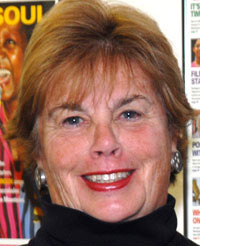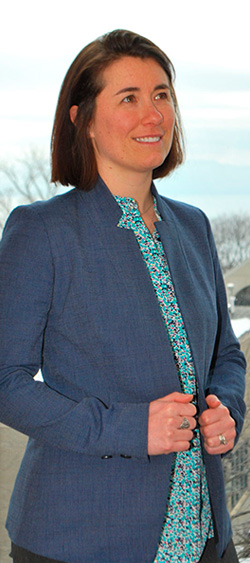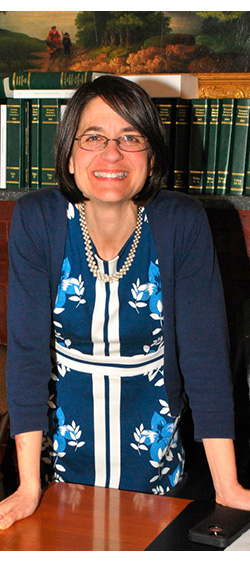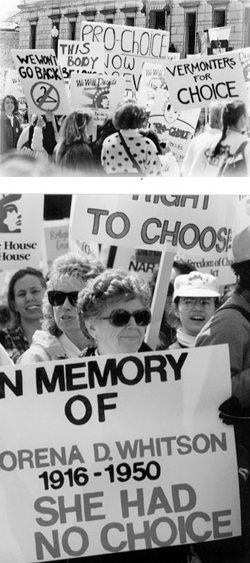| Index - Spring 2018 |
|
Variations on the #MeToo Movement
by Sue Gillis
|
I am often asked if I have a #MeToo story. Actually, I have several, and for some I blame myself. Wrong place, wrong job, wrong time, wrong person. But most never should have happened, and I could do nothing. There was no one to report to. Not human resources, (who writes their paycheck?) not the police, (all men and no power anyway) and not parents or friends (helpless.) It’s the way it was. The system was stacked against women. Women were powerless, and men knew it. Women lost every time. No more.
Continue Reading...
|

|
|
Making Her Mark: Sarah George, Chittenden County State’s Attorney
by Elayne Clift
|
In 2016, when people urged Sarah George to run for Chittenden County state’s attorney because T.J. Donovan was running for attorney general, her first reaction was “I can’t do that. I don’t know enough about politics!” Nevertheless, she threw her hat in the ring and won, filling a two-year vacancy created when Donovan won his election. In November, she will run again for a second term of office, and this time, she knows a lot about politics.
George, who grew up in Quechee—where she still works part-time as a waitress at the Simon Pearce Restaurant—studied psychology and criminal justice as an undergraduate at the University of Connecticut with the goal of becoming a behavioral analyst, possibly for the FBI. She went on to earn a master’s degree in forensic psychology at Castleton State College. By then she realized that what she enjoyed most was the legal aspects of the work she wanted to do. Wanting to make a difference in the criminal justice system, George decided to become a prosecutor.
She attended Vermont Law School from 2007, graduating in 2010. During the summer of 2008, she interned at the Chittenden County State’s Attorney’s Office, and a year later she interned at the Chittenden County Public Defender Office. During her third year of law school, she interned again, this time in the US Attorney’s Office.
After graduating from law school, Donovan, then Chittenden County state’s attorney, hired George to investigate domestic violence cases and later to prosecute them. Once she passed the bar examination in 2010, she became the deputy state’s attorney, a position she held for six years, before becoming the county state’s attorney.
Continue Reading...
|
 Sarah George Sarah George
Photo: Jan Doerler
|
|
Changing the Culture of Sexual Harassment in the State House
by Elayne Clift
|
State senator and majority leader Becca Balint (D, Windham) knew she wanted to be in politics by age 18. She also knew, as a gay woman, that it wouldn’t be easy. As she puts it, “I didn’t know of any gay politicians except for [San Francisco city supervisor] Harvey Milk [who was assassinated in 1978], so I put it on the shelf.”
Earning a BA at Smith College, a master’s degree in education at Harvard, and another master’s in history at the University of Massachusetts Amherst, Balint began her career as a history and social studies teacher, but she always knew that she wasn’t doing the work she felt called to. Encouraged by several mentors and her wife, Elizabeth Wohl, to enter public service, she forged ahead, never believing she would win. But well known for her teaching and her columns in the Brattleboro Reformer, she was victorious, launching a political career in which she has championed a range of issues, including paid leave, consumer protections, affordable health care, and voter access.
Now in her second term, in addition to serving on the Economic Development and Housing Committee as well as being vice chair of the Education Committee, Balint serves as Democratic majority leader in the senate and chair of the senate’s five-member sexual harassment panel.
Continue Reading...
|
 Photo: Jan Doerler Photo: Jan Doerler
|
|
Historic Clemmons Farm Becomes a Multicultural Center
by Cynthia Close |
The bright but still cold March sun spilled across an impressive array of African art and artifacts, calling attention to the majestic settee and matching chairs fit for African royalty. Sitting in the middle of this eclectically designed living room, in a building called the Bog House, one of several structures at the Clemmons Family Farm, was 94-year-old Lydia Clemmons.
Lydia and her husband, Dr. Jackson Clemmons, have owned the 148-acre farm in Charlotte, Vermont, since 1962. The Clemmons Family Farm is one of only 19 African American–owned farms of the nearly 7,000 farms in Vermont, according to the 2012 agricultural census.
The Clemmons originally came from Cleveland, Ohio. Jackson was offered a job as a pathologist at the University of Vermont Medical Center. He accepted the position, making him only the second African American doctor to work at the center. Lydia was a registered nurse and trained anesthesiologist. At that time the Clemmons had two young children and needed a place to live.
Although Dr. Clemmons spent his youth on a farm, he decided early on that farming would not be his chosen career, and he pursued medicine. In 1961, while preparing for the family’s move to Vermont, he was told about a farm that had been for sale for sometime in a town called Charlotte. The name of the town intrigued him. He was impressed by the history of the property and the beautiful location, so in spite of the rundown condition of the farm, the family cobbled together all the resources they could to purchase the property. Over the course of five decades, the Clemmons gradually restored the farm into a landmark historic estate.
Continue Reading...
|

|
|
Crafting a Climate Action Agenda in Vermont
by K.C. Whiteley
|
The legislature has rolled past “cross over” into the home stretch of year two of this biennium; bills that are no longer in play will have to be reintroduced next session or dropped. It’s too soon to tell how environmental issues will fare after last year’s disappointing lack of leadership on what were thought to be a few easy wins.
Some chalk up 2017’s lackluster achievements as the result of a wait-and-see grace period as new leadership in both legislative chambers and a new governor scoped out each other’s positions. Where did the governor really stand on climate change issues and Vermont’s renewable energy goals? Who would step up to become climate change champions in the house and senate? While Gov. Scott proved himself to be firmly aligned with business interests and disinterested or opposed to any progressive energy agenda, no clear climate agenda leaders emerged from the legislature.
VCAC Report
After the 2017 session ended, Scott appointed a 21-member Vermont Climate Action Commission (VCAC) in what has turned out to be a token gesture to address strong public support for Vermont’s renewable energy goals. The commission was charged to hold public meetings and come up with recommendations to reduce greenhouse gas emissions and combat climate change.
Continue Reading...
|

|
|
UVM Medical Center Lifts Ban on Elective Abortions
by Sally Ballin
|
Hallelujah! High time! Long overdue! These were some of the reactions from warriors of the 1970’s struggle for abortion rights in Vermont when news broke that UVM Medical Center (UVMMC) had reversed its long-standing policy against providing elective abortions.
Three days after the 45th anniversary of Roe v. Wade, pro-choice Vermonters were happily surprised to learn that the board of directors of the medical center had voted to lift the ban on elective abortions that had been on the books for decades.
Many Vermonters may be surprised to learn that Vermont’s flagship teaching hospital has not been providing elective abortions right along, given that abortion has been legal in this state since 1972.
In fact, veterans of the abortion rights movement, although they welcomed the news, were surprised by the seemingly sudden policy reversal and wondered what was different now, after all these years, and what prompted the change.
Indeed, it is ironic that although Vermont was the second state to legalize abortion, its major hospital in its largest city is only now opening its doors for elective abortions; it has always provided medically necessary abortions for women whose pregnancies have gone wrong.
Continue Reading...
|

|
|
In the Stacks: Book Reviews
|
Screwnomics: How Our Economy Works Against Women and Real Ways to Make Lasting Change by Rickey Gard Diamond
Book Review by Lori Lustberg
Behind These Hills: Poems by Susan Sanders and Jessica Sicely
Book review by Kate Mueller
Whole Worlds Could Pass Away by Rickey Gard Diamond
Book review by Bronwyn Fryer
Continue Reading...
|

|
|